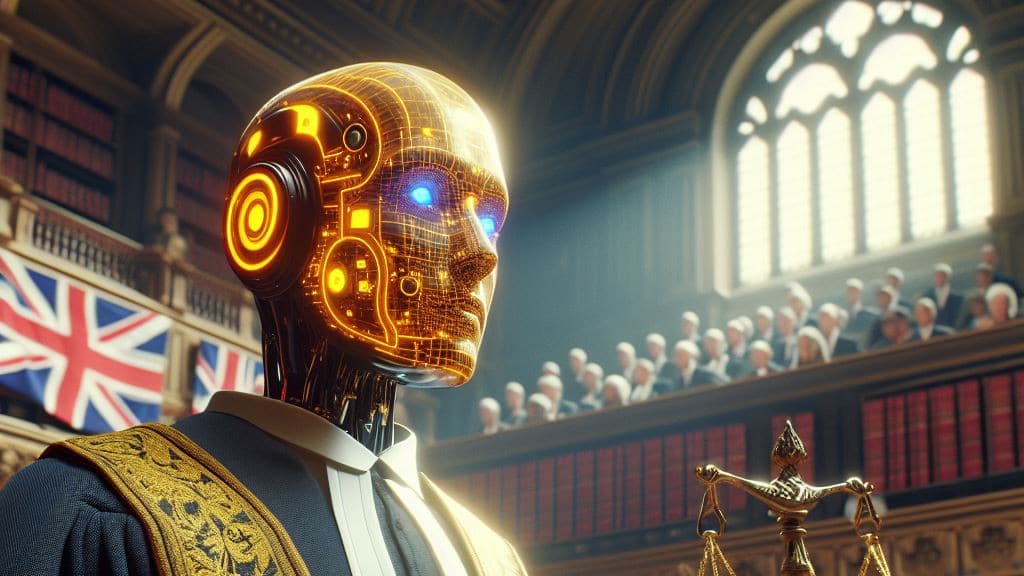
Published Date: December 20, 2023 9:30 AM Updated Date: December 20, 2023 9:30 AM

Correction and fact check date: December 20, 2023, 9:30 a.m.
briefly
This case centered on whether artificial intelligence can be recognized as the rightful owner of a patent.

American computer scientist Stephen Thaler has faced a setback in a legal battle in the UK as he tries to secure patent rights for an invention based on his artificial intelligence (AI) system.
This case centered on whether artificial intelligence can be recognized as the rightful owner of a patent. Thaler, who proposed two patents generated by an AI system called DABUS (Device for Autonomous Bootstrapping of Unified Sentience), was rejected by the UK Intellectual Property Office.
The rejection was based on the argument that patents could only be granted to humans or companies, not machines. Thaler appealed to the UK Supreme Court, which ultimately unanimously rejected his plea.
The court ruled that under current UK patent law, an inventor “must be a natural person.”
“This appeal addresses the broader question of whether technological advancements generated by machines that operate autonomously and are powered by AI can be patented,” Justice David Kitchin said in the court ruling, Reuters reported. “It’s not relevant to the question.”
“It is also not relevant to the question of whether the meaning of the term ‘inventor’ should be expanded to include machines powered by AI. Machines powered by AI create new and non-obvious products and processes, which can be thought of as giving them an advantage over them. It’s already known,” Kitchin added.
Thaler’s legal representatives issued a statement arguing that the ruling highlighted the inadequacy of current UK patent law in protecting autonomously generated AI inventions.
This legal setback in the UK mirrors previous disappointment in the US where the Supreme Court decided not to hear a challenge to the US Patent and Trademark Office’s refusal to grant patents for inventions derived from AI systems.
Thaler’s long fight to have AI listed as a patented inventor
In 2021, the South African Companies and Intellectual Property Commission officially granted a patent to a food container designed using fractal geometry from the artificial intelligence system DABUS.
The patent application submitted under the Patent Cooperation Treaty on September 17, 2019 marked a distinctive start by designating DABUS as the inventor of the food container. The application explicitly claimed that the invention was created automatically by AI.
Ryan Abbott – Thaler’s attorney and his team have filed applications to register the computer as an inventor in at least 17 jurisdictions around the world. The team received favorable reviews in South Africa and Australia. However, the Australian patent team appealed the court’s decision.
Also in September 2021, U.S. District Court Judge Leonie Brinkema dismissed the appeal and denied the patent. According to the judge, under U.S. law, only humans have the privilege of being inventors, and when it comes to providing inventor status to AI, the clear answer is “no.”
It will be interesting to see how Thaler and his team proceed with this being rejected by the UK courts today. Thaler’s legal team highlighted the inadequacy of the current law. This setback reflects global struggles, including a successful South African patent following previous disappointments in the United States. Thaler’s next move remains uncertain, adding complexity to the ongoing conversation about AI and intellectual property.
disclaimer
In accordance with the Trust Project Guidelines, the information provided on these pages is not intended and should not be construed as legal, tax, investment, financial or any other form of advice. It is important to invest only what you can afford to lose and, when in doubt, seek independent financial advice. We recommend that you refer to the Terms of Use and help and support pages provided by the publisher or advertiser for more information. Although MetaversePost is committed to accurate and unbiased reporting, market conditions may change without notice.
About the author
Kumar is an experienced technology journalist specializing in the dynamic intersection of emerging fields including AI/ML, marketing technology, cryptocurrency, blockchain, and NFTs. With over three years of experience in the industry, Kumar has established a proven track record in crafting compelling narratives, conducting insightful interviews, and providing comprehensive insights. Kumar’s expertise lies in producing impactful content, including articles, reports and research publications for prominent industry platforms. With a unique skill at combining technical knowledge and storytelling, Kumar excels at communicating complex technical concepts in a clear and engaging way to diverse audiences.
more articles


Kumar is an experienced technology journalist specializing in the dynamic intersection of emerging fields including AI/ML, marketing technology, cryptocurrency, blockchain, and NFTs. With over three years of experience in the industry, Kumar has established a proven track record in crafting compelling narratives, conducting insightful interviews, and providing comprehensive insights. Kumar’s specialty is producing high-impact content including articles, reports and research publications for prominent industry platforms. With a unique skill at combining technical knowledge and storytelling, Kumar excels at communicating complex technical concepts in a clear and engaging way to diverse audiences.
